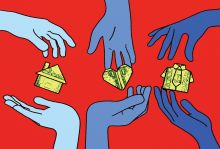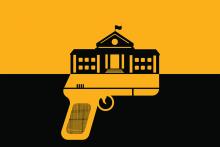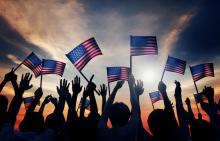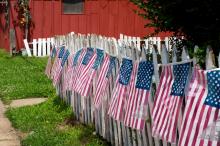individualism

EVERY MONTH, TERRY KELLY sends a “rent” check to the Duwamish Tribe on behalf of Quest Church in Seattle, where Kelly serves as senior director of finance.
The church owns the property where it holds services. But the congregation’s monthly payment acknowledges and honors the Duwamish people and other original inhabitants of the land the church occupies, people who have never been “justly compensated for their land, resources, and livelihood,” as the Duwamish “real rent” program puts it.
Members of Quest Church are among the many people of faith who are reimagining the narrative of money in our world today.
The early Christian church was clear in its teachings that money was intended to be used for the benefit of the broader community, not for individual enrichment. But for centuries, and particularly since the Protestant Reformation, the institutional church has more often contributed to ideologies and illusions that reinforce the American form of hypercapitalism. And while money remains a highly visible reality in our everyday existence, our lived stories around money often go uninterrogated.
In America, our views about money tend to be very individualized. We ask questions such as: How is my money going to work for me? Will I have enough to pay bills or retire comfortably? What is my purchasing power? Even the story churches tell is often limited in scope, reduced to teaching about tithes, offerings, building funds, and missions giving. In some instances, we might see positive moves around personal budgeting and reducing debt. But church conversations about money are often left in the realm of personal finance.

AFTER A TEENAGER shot dead 19 children and two teachers in an elementary school in Uvalde, Texas, last year, I spent two weeks putting my children on the bus to school with a pit in my belly. Then the term ended, and I breathed relief. I would not have to live with this low-level dread for another year.
My family has been on sabbatical in South America for the past 12 months, homeschooling our three boys. Though we’ve faced other risks, the possibility of my kids being shot in school was not one of them. Not only were they not attending school, but the countries we visited also have stricter gun regulations than the United States.
In the U.S., the purchase of guns has soared — gun ownership is estimated to be more than 120 per 100 people, according to GunPolicy.org. Gun-related deaths in the U.S. also top every other high-income country, at more than 12 per 100,000 people annually. Compare that to Ecuador, where we spent part of our sabbatical. In 2017, it had 2.7 guns per 100 people and approximately three gun-related deaths per 100,000 people. Our sabbatical year has been a window into what it’s like to parent school-aged children without the shadow of school shooting anxiety.

IN 2011, I took a course at my Christian college about the personality type system known as the Enneagram.
The Enneagram is a system built around nine personality types, with each type providing a unique perspective on how we navigate our relationships, emotions, and the world around us. The Enneagram draws on both spirituality and psychology, which distinguishes it from many other personality indicators.
A primary question that emerged for me from that college class: Does the inner work that the Enneagram encourages manifest itself in the outer world through justice work, or is the Enneagram primarily a tool meant to encourage people to focus on individual healing, career, and spirituality?
Throughout history, questions about how and why each human has a unique set of behaviors, motivations, emotions, and cognitions have preoccupied philosophers, psychologists, sociologists, religious thinkers, and Buzzfeed quiz creators alike. Indeed, in the 21st century, “know thyself” is less of a thought-provoking ancient Greek aphorism and more of a cultural imperative lauded by the self-help industrial complex and career coaches. We are assured that by unlocking our “true selves,” we will ultimately be unlocking our true potential, which will drastically improve our fortunes.
But the Enneagram was never meant to simply measure our potential or provide a definitive answer to the question of human personality. This is contrary to some of the most popular personality indicators such as Myers-Briggs or CliftonStrengths (formerly StrengthsFinder), which became popular because they promised to help employers tap into human potential and productivity. The Enneagram originated as a tool for contemplation but has come to emphasize how self-growth and inner work prepare us for the outer work of building community.
daniels.enneagram.inline1.jpg

In their book The Enneagram: A Christian Perspective, Catholic priest Richard Rohr and Lutheran minister Andreas Ebert point to a 4th-century Christian Desert Father, Evagrius Ponticus, as the first to use, loosely, the nine-pointed symbol to highlight vices that he believed interrupted one’s inner peace and relationship with God. But it wasn’t until the 1970s that Chilean psychiatrist Claudio Naranjo, inspired by a theory originated by Bolivian philosopher Oscar Ichazo, used modern psychology to develop a theory of nine distinct personalities — or “enneatypes” — that highlighted the vices, virtues, and core motivations of each type.
The Enneagram is sometimes treated as just another personality test that can help us purchase the things that “match” our personalities, find romance, or unlock our “true potential” so we can make more money — part of our culture’s obsessive focus on self-improvement. But at its best, the Enneagram not only emphasizes making peace with yourself and a higher power, it also offers tools for learning how to be in community and build a more just society.
To help me sort through my questions, I interviewed three Enneagram experts: Chichi Agorom, an associate faculty member with The Narrative Enneagram and author of The Enneagram for Black Liberation; Jessica Denise Dickson, a life empowerment coach and Enneagram guide who uses the Enneagram in anti-racist workshops; and Abi Robins, a queer, trans Enneagram teacher, coach, and author of The Conscious Enneagram. Their responses have been edited for length and clarity. — Josiah R. Daniels

IN HIS BOOK Community and Growth, Jean Vanier explains that for any community to thrive, there must be more members who can say “me for the community” than those who say “the community for me.”
That simple contrast—me for the community vs. the community for me—captures the heart of the dilemma facing modern Western culture and, by extension, the expressions of the church that are sustained in its midst. The Enlightenment and the models for political, social, and economic life that it spawned in modern Western culture freed humanity from oppressive, authoritarian rule governing thought, religion, and political structures. The role, rights, and agency of the individual became paramount. This revolutionized the philosophical framework for how society should be governed.
In contrast to individualism, what generally can be termed “collectivism” begins by asserting that realities of social groups are the primary reference point for understanding how societies should be organized and governed. In a nutshell, individuals don’t really have a meaningful identity apart from their belonging to a social group. Participation in a collective group, in this view, is both a more realistic understanding of how society functions and is the context that makes individual life possible.
For political philosophy, the question becomes where the starting point is: Does society find its moral foundation in the rights of its individual members, who then make agreements and social contracts for how best to preserve these rights? Or does society begin by recognizing we are social beings, and collectively we decide—through various political processes—how best to secure the rights of all who belong to a shared community? Normally this becomes a healthy political dialogue between the primacy of individual freedom and the responsibility of upholding the common good of society.
But ideas can be pushed to extremes, at times with frightful consequences of enormous social evil.

I did not celebrate Independence Day this past weekend.
The truth is the United States has never been an independent nation. Built on stolen land by stolen labor, sacrificing Natives and Africans and their descendants to the mythology of “manifest destiny,” greed, oppression, and white supremacy, this has never been a nation of liberty and justice for all.
The ignoble myth of white supremacy that permeates the foundation of this country and underlies the policies and institutions that form the context of our lives has been rearing its ugly head so much lately that it cannot be as easily ignored or denied as it has been in the past. The recent massacre in Charleston and the burning of African-American churches add even more reasons to the hundreds of thousands to awaken to the reality of racism that undermines best ideals of this nation. Our country has failed to atone for, or even critically examine, its history of racial oppression.

Let’s talk about we.
You know: The first word in the constitution. The one that puts everything that follows it inside a framework of a collective effort and combined responsibility. "We the people." All of us. Together. Part of something bigger than any one of us individually. Yeah, that word.
Have you noticed that we don’t discuss that idea very much? I wonder why. A lot of Fourth of July posts this year went on lavishly about individual rights and personal freedom. And yes, those are important. But they’re only part of the equation, and they’re not even the starting point. It starts not with me, but with we — a pronoun that is radical and revolutionary.

I noticed a loose thread in a blanket the other day and was reminded of something my mom always said: Never pull on a loose thread. All that will do is make it worse. It’ll yank on the other threads and wind up creating a knot. Even if you do manage to remove the one loose thread without doing too much damage to the fabric, it’ll leave a space that starts the nearby threads working their way loose, too.
Soon, the whole thing unravels. Removing even one thread from the fabric creates big problems.
Isn’t it the same with us?
Each of us is a thread woven into the fabric of our world. We’re looped around each other, pulled tightly to one another, intimately bound to one another. We’re so closely intertwined that we can’t be separated without making it all unravel.
By ourselves, we are a thread. Together, we are a blanket.
The weaver made it so.

While sitting listening to a musician pour out her heart through music at a show the intern house hosted, I was challenged. The emotions in her voice communicated her story and as I sat there pleasantly soaking in the music and admiring her vulnerability, I also realized I wouldn’t want to put myself out there like that. At that same moment, I stopped and thought, is that how I view church? Do I put up those same walls with God?
Vulnerability is difficult, when our culture thrives on individualism. Television shows, books, and movies tell us that we can create the world we desire through our own strength. This culture tells us that we are the creators of our reality, a societal standard that has seeped into the church, creating a standard of self-reliance and individualism.
Brennan Manning stated, “the church is not a museum for saints but a hospital for sinners.” The church “hospital” should be the place where we come ready for healing and treatment. As such, people generally do not go to a hospital hiding their wounds and disease expecting to get better. This self-medication can only cover the symptoms while never combating the true source of the ailment. The truth is that in life, we are all terminally ill patients with different pains in desperate need of a doctor. In this, we are not alone in the fight.

This morning at breakfast, I was reading an article in the newspaper about how the Affordable Care Act is negatively affecting some individuals — especially those who buy their own insurance, rather than receiving it through an employer. The article was interesting, but what struck me the most was the way the problem was framed. Rather than approaching the story from a public policy angle, the article mainly focused on the reaction of consumers of health-care goods and services. The crux of the article was whether some individuals should be required to buy a product they might not want or need so that other individuals could have affordable access to health-care products they need desperately but might not be able to afford under the old regime.
The dilemma was presented as a story of tension between healthier consumers and less healthy consumers fighting to get the best deal for their health-care dollars. But could there be another way of thinking about health care, and about our society as a whole? Is there a framework that would allow us to consider these questions in a way that assumed connection, caring, and community between individuals, rather than the zero-sum competition of the market?

DUBLIN — Patricia Wojnar left a 32-year career in interior design to pursue a degree that wasn’t in demand: a master’s in bereavement studies.
Having seen four family members die early, she wanted to understand how to adapt.
As it turned out, the degree perfectly prepared her to enter one of Ireland’s emerging professions.
Wojnar is now a registered civil celebrant, presiding over funerals and weddings for people who refuse to associate with Ireland’s scandal-tarred Roman Catholic Church. She’s not alone; many newly minted civil celebrants are starting their own businesses as part of Ireland’s “post-Catholic” economy.
Although many observers have noted the impact of secularization and child abuse scandals on church membership and finances, only now are the Irish seeing the cultural and socioeconomic reverberations. These include a class of people willing to observe life’s most significant milestones outside the church.

As Americans, we live in a culture that is hyper-individuated, fragmented, and dehumanizing as it pushes a mantra of success based on material accumulation and power. Being in community with others is the countercultural answer to this. Doing so with others unlike ourselves is an important part of this. At the end of the day, above the polarization and partisanship, there is much we can do to promote the common good together. As Maddie put it at a meeting that brought Christians of opposing social interpretations together, "We may never agree on some issues, but that is not why we're here; we're good people, you're good people, let's do good together."
CHILDHOOD VACCINATIONS have been a rite of passage for decades now. But in recent years, growing numbers of parents have refused to go along. A movement that began in the 1980s over adverse reactions to the diphtheria, tetanus, and pertussis (DTaP) and mumps, measles, and rubella (MMR) shots started to become a tidal wave in 1998. That’s when a British researcher, Andrew Wakefield, published a study allegedly linking childhood vaccinations to autism.
A decade later, an anti-vaccination trend had spread into a broad swath of educated, upper- middle-class Americans inclined toward “alternative” lifestyles. It has been especially strong in the Pacific Northwest. In one county in Washington state, according to the February 2012 New England Journal of Medicine, 72 percent of kindergarteners and a whopping 89 percent of sixth graders were not fully vaccinated. Under pressure from this new constituency, many jurisdictions made it easier to get vaccine exemptions, adding to the existing “religious” exemption a new one for “philosophy” or “personal beliefs.”
Then, in 2011, the Wakefield autism study that had sparked the anti-vaccination movement was completely discredited. The British medical journal The Lancet, which had published Wakefield’s article on his findings, officially retracted it. That should have been that. But it wasn’t. In the last year public health advocates have learned the hard way that once something is on the internet it never goes away and, as one scientist told PBS’ Frontline, “People were much more likely to believe something they had seen on YouTube than the Centers for Disease Control.”
Now doctors and state governments are pushing back, and a new round in the vaccination war has begun. Washington now requires a doctor’s signature on those philosophical exemptions. In March, the Vermont Senate repealed the state’s philosophical exemption. All over the country, family doctors and pediatricians are refusing to see patients who don’t comply with vaccinations.

What is Ubuntu? The principle of Ubuntu was birthed in Africa and there is no direct translation of the word into English. Archbishop Desmond Tutu summarizes it well:
“You know when it is there, and it is obvious when it is absent. It has to do with what it means to be truly human, it refers to gentleness, to compassion, to hospitality, to openness to others, to vulnerability, to be available for others and to know that you are bound up with them in the bundle of life, for a person is only a person through other persons.”
The observations of my life thus far have led me to conclude that it is popular to argue for the advancement of the individual.
In reading some of the responses to my last post Embodied Theology, I was reminded of an essay I wrote for a class last semester, so I've rewritten part of it as a blog post to help clarify my position.
Embodied theology is rooted in the doctrine of creation. Why did God create us? As some have proposed, God couldn't not create or love us -- it's just part of God's nature. As a relational giver and lover within the Trinity, God couldn't help but be the same thing in relation with humanity. Who we are comes from God. We are not by nature sinful broken creatures, but creatures shaped in the very image of God.
Over the past few weeks various news outlets have run stories on the so-called feminism of Sarah Palin and Michele Bachmann. Typical of the media, in order to make that claim, they, of course, had to assume that any woman doing anything in public equals some sort of feminist revolution. It is, however, a rapidly spreading idea. If the concept of successful women must be blamed on feminist action, then successful conservative women must be the result of feminism as well. Granted this new definition of "feminist" is, as Lisa Miller wrote for the Washington Post, "a fiscally conservative, pro-life butt-kicker in public, a cooperative helpmate at home, and a Christian wife and mother, above all." But apparently it's still feminism.
While many from the left were outraged by the idea of associating these arch-conservatives, who stand against many of the things historical feminists have supported, with feminism, others supported the idea. Naomi Wolf, who seems to have a love/hate relationship with feminism, wrote that the problem some have with calling those women feminists is that we don't understand the history of feminism. She argues (rightly in my opinion) that feminism has only become associated with leftist agendas since the 1960's, but was, in its origins, more balanced and open to conservative values. But then she explains her reasoning why:
In one of the most-viewed articles on FoxNews.com several weeks ago, writer Onkar Ghate presents a choice of competing moralities between Ayn Rand and Jesus. While his exegetical powers leave much to be desired, he is correct in noting that the choice many Americans will have to make, as far as political philosophies go, is between Ayn Rand and Jesus.